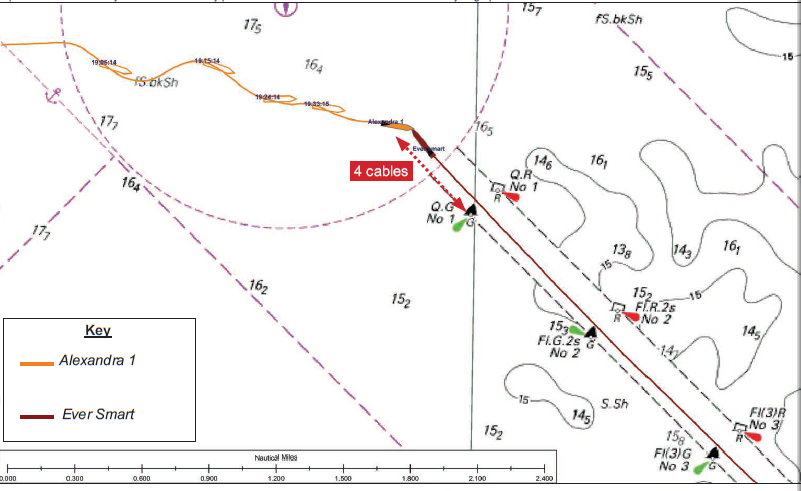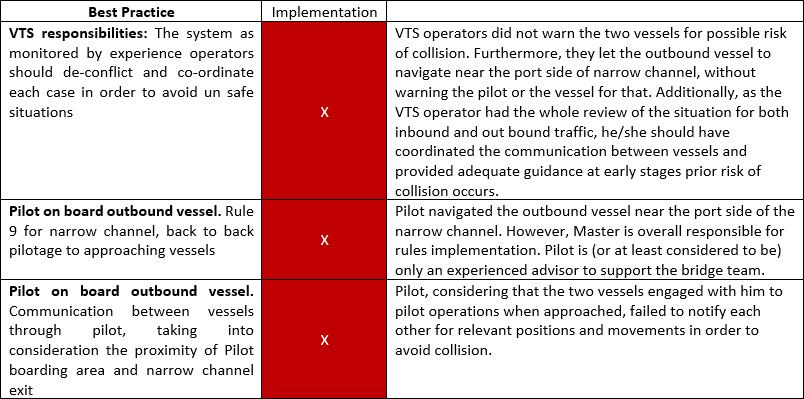On 11th February 2015, the Marshall Islands registered oil tanker Alexandra 1 and the United Kingdom registered container ship Ever Smart collided near the entrance to the buoyed approach channel in Jebel Ali, United Arab Emirates. The analysis of this collision highlights important key lessons, taking into consideration that both vessels were modern, equipped with advanced systems for navigation & communication and manned with certified experienced crews, under the supervision and guidance of a VTS collided, within Port limits.
At the time of the collision, the ‘Ever Smart’ container ship was outbound to exit the channel while the ‘Alexandra 1’ tanker was inbound to enter the channel (Image). The accident happened close to midnight hours (night time darkness) in an area controlled and monitored by Jebel Ali’s Vessel Traffic Service. The sea was calm with a low swell. The tidal stream was south-easterly at less than 1 knot and the visibility considered to be good (10-12 miles). The container vessel (Ever Smart), had just disembarked the pilot and the inbound tanker (Alexandra 1) was approaching to embark the same pilot for entering Jebel Ali. Both vessels suffered major structural damage to their bows but there were no injuries or pollution.


The COLREGs and common seamanship practices provide the frame on how to overcome such situations (Table 1). Both vessels were involved in the accident which happened within port limits; also, additional parts were engaged such as VTS operator and pilot (Table 2).

In particular, there was a confused implementation – or precisely, not implementation – of several COLREGs and best seamanship practices; on top of that, inadequate supervision and guidance by standardized responsible systems (such as VTS or Pilots) may lead to dangerous and risky situations and accidents, as happened in this case.
[smlsubform prepend=”GET THE SAFETY4SEA IN YOUR INBOX!” showname=false emailtxt=”” emailholder=”Enter your email address” showsubmit=true submittxt=”Submit” jsthanks=false thankyou=”Thank you for subscribing to our mailing list”]
Concluding, the Court of Appeal that judged the situation came into the following results:
- Apportioned liability: 20% to Alexandra 1 and 80% to Ever Smart.
- Where a vessel was preparing to enter a narrow channel, the narrow channel rule applied in place of the crossing rule. Rule 15, the crossing rule, did not apply to Alexandra 1 as she approached the channel. Her duty was to navigate in such a manner that, when she reached the channel, she would be on its starboard side in accordance with rule 9.
- Ever Smart had been in breach of rule 9 in not navigating on the starboard side of the channel, and this was irrespective of the fact that Alexandra 1 was not yet in the narrow channel.
- There had been a breach of rule 5 by Ever Smart in that the master had failed to keep a proper lookout, irrespective of the presence of the pilot on board, as well as a breach of rule 7 in that he had failed to confirm his assumptions as to how the ships would pass.
- The speed of Ever Smart had been excessive, she had failed to take avoiding action and she had failed to sound warning blasts. These failings were a result of the failure to keep a proper lookout.
- Alexandra 1 had failed to keep a good aural lookout and had thereby contributed to the collision.

































































The vessel being in a pilotage doesn’t relieve the master and crew from their responsibilities. But he sad truth is onboard people feel slightly comfortable and relaxed as soon the pilot boarded and creates less situational awareness among the ship personnels. Not in everyship but few of them. In this particular case the same pilot is assigned for both the ships. VTS comes into the picture atlast. But it’s the people onboard navigating the ship. If TWO individual pilots were assigned atleast one of them should have bought the situation under control, rather than concentrating on pilot exchange. This is my opinion, I feel like this should also considered with above findings. In this scenario there are many possibilities of communication errors since the same pilot is boarding 2 ships as well as causing lack of situational awareness. 1 pilot is sufficient as we all know but it has to be done efficiently from all the personnels involved until the VTS.
Nowadays OOW relies too much on new technologies and forgets the basic principles . Well said Pilot on board does not relieve the Master or the OOW from their responsibilities. Autonomous vessel ?
One would say a quite strange decision on proportion of Blame because :
1) Alexandra 1 (let’s not forget that is VLCC !! ) has been deep in the pilot pick up area without the pilot on bridge
2) Alexandra 1 without the pilot and knowing there is an outbanb vessel on exit approached the entrance channel in such course / speed that she would never be able to keep her at the starbord side of the channel once at the channel entrance without hampering / obstructing the whole entrance of the channel. ( she would cross channel entrance exit route twice – first in approaching then when entering)
3) Bad Seamanship prevailing on board Alexandra 1 – even entering a subway or buss one will give a way to those exiting)…
I would like to know, why it is said in the article that Rule 15 does not apply to Alexandra 1. I do believe that Rule 15 apply in this case and Alexandra 1 was suppose to keep out of the way of Ever smart.